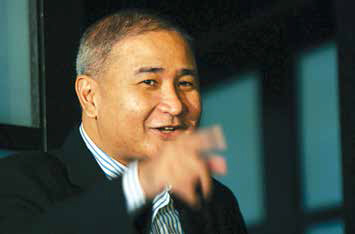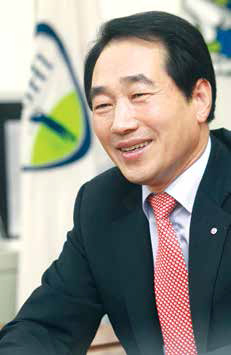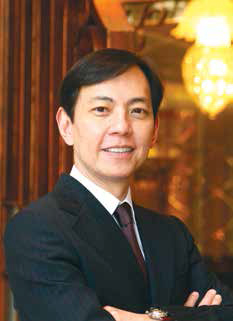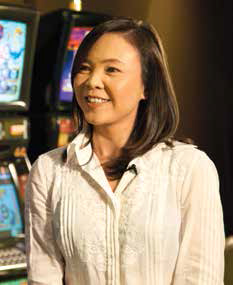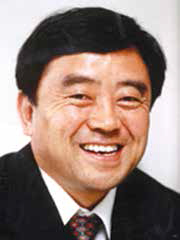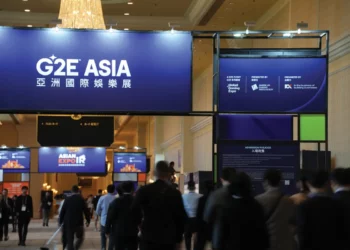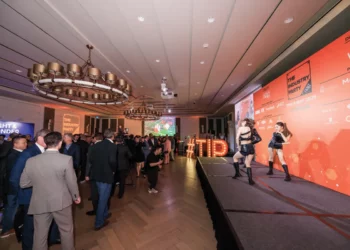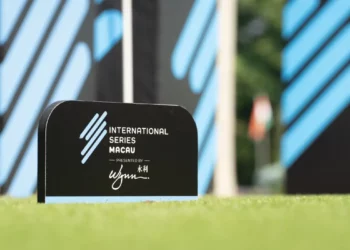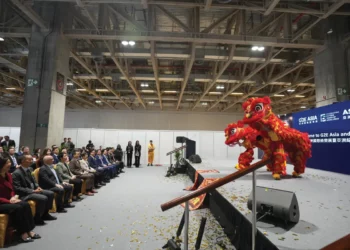31 Jack Lam
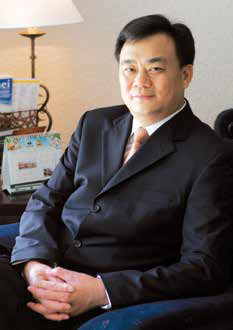
Chairman
Jimei Group
Jack Lam may not be quite the force in the “new” Macau as he surely was in the old, but the chairman of Jimei Group still sits atop an empire consisting of some of the city’s leading VIP rooms, a casino at the Grand Lapa Macau and a diversified portfolio of investments in property, financial services, tour and travel, casino cruises, a resort in the Philippines, a junket room in one of Seven Luck’s popular foreigners-only casinos in Seoul and the recent addition of a VIP operation at the new Solaire Resort & Casino in Manila.
In the Macau junket sector, which accounts for much of the heft of the portfolio, Jimei is believed to rank among the top five operators by rolling chip turnover, and as a measure of his prominence he is one of the few junketeers to run a property in his own right, having taken over the Casino Oriental at the former Mandarin Oriental back in 2009 with the blessing of its owner, Stanley Ho’s Sociedade de Jogos de Macau. Located under the roof of the renamed Grand Lapa, the refurbished and rebranded Jimei Casino operates as a “satellite” of SJM in exchange for a share of revenues.
But the Philippines remains the most audacious of the investments the 52-yearold has pursued, and Fontana Leisure Parks, a sprawling holiday getaway he’s assembled around 300 hectares of a former US military base north of Manila, is certainly his most imaginative.
Mr Lam had been running gambling packages to the Philippines from Hong Kong, Taiwan and South Korea for years and cultivating relationships along the way with politicians and government officials that bore fruit with VIP rooms in casinos in Pasay City and Cebu and an interest in the Fort Ilocondia Resort and Hotel on the South China Sea in northern Luzon.
But it’s the Fontana complex, located in the Clark Special Economic Zone about 80 kilometers from the capital, that has grown to become Jimei’s flagship—a collection of family-style holiday villas and time shares, a hotel, a water park, golf courses, fitness facilities, a sauna and spa, restaurants, meeting and convention space and a boutique casino—a leisure city within a city, catering both to locals and to a Chinese and Korean clientele that Jimei has come to know intimately over the years. Fontana marked its ninth anniversary in April.
Mr Lam was born in Guangzhou and moved to Hong Kong at the age of 18. He started out as a bookkeeper at an uncle’s factory, earning a mere HK$1,000 (US$128) a month. He got his introduction to gaming through his uncle, who gambled regularly in Macau. While accompanying his uncle on several trips to the city’s casinos, he built up a network of contacts and started working as a junket sub-agent, a position that gave him insight into the nuts and bolts of building and maintaining customer relationships. By the early ’80s, he was working as a small-time junket representative in Macau. Through diligence and a solid understanding of his clientele, he gradually emerged as a leader in the industry.
32 Cristino Naguiat
Chairman and CEO
Philippine Amusement and Gaming Corporation
Regulating a growing national gambling industry is not an easy job under the best of conditions, and in the Philippines, where such conditions rarely prevail, it can be filled with pitfalls. Cristino Naguiat has been negotiating them for three years and making a pretty good show of it too. He’s maintained the stable operation of the government’s third-largest source of revenue, and with the opening earlier this year of Entertainment City’s first integrated resort he can take credit for having shepherded one of its pivotal economic development schemes from vision to reality, a vision he kept alive when all might have been lost amid the corruption scandals that attended the fall of his predecessor.
As a regulator he’s charged with overseeing compliance in a national market that’s doubled in size since he took office—driven mostly by Resorts World Manila, which opened in 2009 as the country’s fourth privately owned casino and its largest by far—and it’s going to get a lot bigger now that Solaire Resort & Casino is up and running and Entertainment City’s second licensee, the US$1.3 billion Belle Grande Manila Bay, has set a mid-2014 opening date.
Mr Naguiat forecasts the market will generate $2.5 billion in total revenues this year, reaching $10 billion by 2017, when all four Entertainment City IRs are expected to be up and running.
Good news for the country’s stubbornly high unemployment rate and for the thousands of Philippine nationals working abroad. But it means pressure will be mounting on PAGCOR to get out of operations and concentrate on regulation. President Benigno Aquino’s supporters in Congress have been pushing such a bill for more than a year. And it’s not making it any easier for Mr Naguiat to keep the corporation’s Casino Filipino brand competitive in one of the few countries in the world where private- and public-sector gaming jostle daily for players. That effort was slapped with a fresh challenge in April with a court ruling that says all the country’s licensees, including PAGCOR, must pay the 30% corporate income tax on top of their gaming taxes and fees. PAGCOR was hit in addition with a requirement to pay a 5% franchise tax.
The corporation missed its profit target for the first half of the year by 5%, in part due to higher contributions to the government. Net income was PHP1.4 billion (US$31.9 million) on total revenues of PHP21.06 billion ($480.2 million), which were down slightly from the same period last year.
On the plus side, results from the 7,100 machine games and 650 table games operated by Casino Filipino and some two dozen PAGCOR slot arcades exceeded forecasts, coming in at PHP14.73 billion.
Moreover, the corporation managed to reduce expenses in the first half while exceeding its projected contributions to the government by 16%. Those payments amounted to PHP10.64 billion, the bulk of which—50% after deducting the franchise tax—went directly to the Bureau of the Treasury.
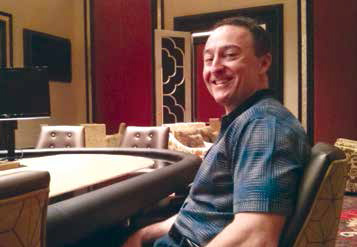
33 Michael Santangelo
Vice President and Chief Operating Officer
Ho Tram Project Co. Ltd
The Grand – Ho Tram Strip has overcome its share of challenges to get the doors open—not least among them the abrupt exit earlier this year of MGM Resorts International as management partner— and there will be more to come for Vietnam’s first experiment in large-scale destination gaming.
With casinos off limits to the country’s citizens, The Grand’s success depends on its ability to market itself to big-spending foreigners and comfortably transport them the 125 or so kilometers from Ho Chi Minh City to what is a fabulously appointed property on one of the country’s most beautiful stretches of beach.
That’s where COO Michael Santangelo comes in. He’s responsible for managing the operation and providing the strategic direction, a job that takes in everything from gaming and marketing to finance and IT—or as he describes it, rather more succinctly, providing The Grand’s guests with the “ultimate integrated resort experience”.
So far, it’s been so good. Hotel bookings have been pleasantly higher than expected. Weekends are sold out heading into this month. Mr Santangelo has to keep the momentum going. As a relative newcomer to the industry it will take all the experience and savvy he’s been able to muster.
Fortunately, he’s no stranger to Asia. His background in accounting and finance brought him to semiconductor giant Amkor Technology back in the 1990s. He served for 14 years as CFO out of the company’s Philippines office. He came to Las Vegas in 2007 to handle the books for no less than The Venetian as vice president of finance and controller. He moved down the Strip two years later to take on the same responsibilities at The Cosmopolitan, which had just opened.
That’s where he came to the notice of MGM, which snapped him up last March and brought him to the South China Sea coast.
34 David Chow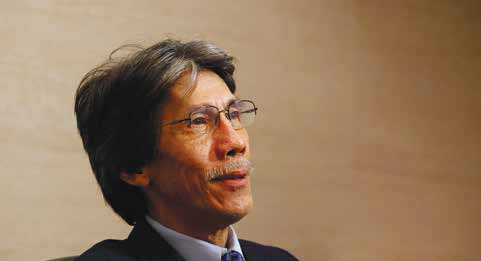
Co-Chairman
Macau Legend Development Ltd
David Chow took a chunk of Macau Legend Development public in July, raising US$238 million to remake the company’s moribund Fisherman’s Wharf theme park on the city’s Outer Harbour and renovate and expand its Landmark Macau hotel. It was a lot less than the $600 million he’d hoped for. But Mr Chow has never lacked for connections or chutzpah. The 62-yearold entrepreneur, investor, husbandman, high-stakes gambler, junketeer, honorary consul and all-around mover and shaker, a former member of the Macau Legislative Assembly and a longtime partner of Stanley Ho’s, believes he still has a thing or two to teach the “new entries,” as he derides his Vegas-style competition on Cotai.
For years, Mr Chow has been floating plans for Fisherman’s Wharf, the sprawling 109,000-square-meter promenade he and Mr Ho opened in 2005 in a location that seemingly couldn’t miss, next door to the Macau Ferry Terminal, and done up with a bit of everything—restaurants, cafes, shops, meeting and exhibition space, a family arcade, a hotel, a marina, a scale-model volcano, a Roman amphitheater, a Tang Dynasty castle, a fancifully grotesque casino called Babylon—all, that is, except visitors.
But things now look to be taking shape. Last year, the company restructured with the aid of $62 million from casino giant Sociedade de Jogos de Macau, the successor to the gambling monopoly Mr Ho controlled for four decades and licensor of Macau Legend’s two casinos. Mr Chow brought on a co-chairman, the older brother of the head of Hong Kong’s Securities and Futures Commission. He won a bid for 30,000 square meters on Hengqin Island, where he plans to develop a commercial complex with a shopping mall, and plans were announced for Fisherman’s Wharf that include three new hotels—1,300 rooms and 350 table games in total—a yacht club, a machine gaming venue run by Japanese pachinko giant Dynam Holdings, which bought $35 million of the IPO, and a dinosaur museum replete with fossils culled from collections in China.
It’s going to take a lot more than $238 million to get all that on, but the Landmark runs at 92% occupancy, and its Pharaoh’s Palace Casino is a cash cow, contributing almost all of Macau Legend’s gaming revenue, which was up 19% in the first half to HK$623 million ($80 million), and most of its total revenues, which grew a robust 25% year on year to HK$843.8 million. Renovation of the Landmark is well under way—all remodeled rooms, more shops and a 3,160-square-meter spa and sauna— and slated for completion the end of this year. The Dynam venue, which opens next summer, around the same time as the first of the new Fisherman’s Wharf hotels, includes a joint marketing agreement aimed at bringing in more players from Japan and Korea.
35 Choi Hung-jib
President and CEO
Kangwon Land Inc.
Choi Hung-jib, 62, is a former governor of South Korea’s Gangwon Province—the economically depressed former coal mining region where the majority state-owned Kangwon Land casino is located. He was appointed CEO of this most remote and the most lucrative of the country’s gambling operations in July 2011, becoming the seventh person to head it since it was founded in 2003 as a sovereign wealth fund for all intents and purposes, designed to plow its profits back into the regional economy and community. He replaced Choi Yung, who resigned amid an investigation into allegations of corruption.
Kangwon Land is the only one of South Korea’s 17 casinos where Koreans are allowed to play, and owing to that exclusive position, generates a great deal of money. On weekends, eager city dwellers pay local grannies the equivalent of hundreds of US dollars just for reserving seats for them at the tables. The property generates gross revenues in excess of US$1 billion per year.
Not surprisingly, it has always been capacity-constrained. The casino opened with 30 table games. Following 18 months of steady expansion, the National Gaming Control Commission imposed a cap of 132 tables and 960 machines in line with government orders to limit the casino industry’s income. That cap, which led to sluggish revenue growth, remained in place until November last year. Following its lifting, Kangwon Land quickly expanded, having the new maximum allowable 200 tables and 1,360 machines in place by June. The casino reported soft second quarter results, with revenue up a mere 1.1% year on year to KRW298 billion (US$268 million), but the third quarter is expected to come in much stronger given the boost provided by the expansion.
Political involvement in commercial ventures can have its upside as well as downside—especially in East Asia. South Korea chose Gangwon for its winning bid for the 2018 Winter Olympics. The event will be held at Pyeongchang, up the road from Kangwon Land. The property, which also has a ski resort, is likely to benefit from the huge influx of visitors expected in the region.
The downside is that no matter how successful Kangwon Land has been—including overcoming the not inconsiderable handicap of being 125 miles and four hours’ drive along difficult mountain roads from the capital of Seoul— as a publicly owned venture it constantly risks having the rug pulled from under it.
Kangwon Land’s exclusive right to serve domestic gamblers expires in 2025, and authorities say that licensing for at least one new venue catering to locals could take place at that time or soon after. Furthermore, official plans call for the licensing of up to five resort-scale casinos over the next decade or so.
It’s not all bad news for Kangwon Land, though. In anticipation of the Winter Olympics, the central government is planning to build an upgraded road to connect Pyeongchang and the county of Jeongseon, where Kangwon Land is situated.
36 Sonny Yeung
Chairman
Success Universe Group
Hong Kong-listed Success Universe Group, best known for running Ponte 16 Resort, Macau, has diversified into the burgeoning China lottery sector. In late 2012, the company began operations of its China Sports Lottery technology service platform and providing sales agency services to the Sports Lottery administration centers in Jiangxi and Qinghai provinces. Success Universe plans to extend its services to other parts of the country and has also launched a dedicated website, www.128cai.com, offering lottery and market information and online support services.
It’s early days for the company’s lottery segment, but in 2012 it generated approximately HK$10.7 million in revenue (US$1.4 million). Though the company’s lottery interests have a way to go before turning a profit, they appear on track to benefit from continued strong demand. China lottery sales surged 18% year on year to RMB261.5 billion in 2012 (US$42.7 billion), with Sports Lottery sales up 17.8% to RMB110.5 billion.
Meanwhile, the Ponte 16 casino resort, in which Success Universe holds a 46.8% stake, also benefited from robust demand among mainland Chinese punters. Ponte 16, one of Sociedade de Jogos de Macau’s 14 “satellite” casinos, is 51% owned by SJM, with Success Universe acting as the third-party promoter, effectively controlling most of the business. The property got off to a sluggish start following its February 2008 opening but has recorded continuous improvement in its operating results since then. It recorded its first profit in 2011, and last year saw EBITDA increase a further 5% to HK$331.5 million.
One of the distinguishing features of Ponte 16 vis à vis SJM’s other satellite casinos is the throngs of local players it draws to its main casino floor. Whereas in Macau VIP baccarat accounts for over two-thirds of total gaming revenue, at Ponte 16 its share is closer to 50%, reflecting the property’s strong mass-market appeal.
Ponte 16’s trademark attraction is Asia’s first and only Michael Jackson museum, which records the milestones in the King of Pop’s career and displays a collection of more than 40 artifacts related to the artist (including the famous rhinestoneencrusted glove he wore the first time he performed the “moonwalk” on American television). The property’s other major non-gaming draw is its unique location at Macau’s Inner Harbor, within a somewhat dilapidated neighborhood but offering easy access to the city’s UNESCO World Heritage sites. Part of its remit, in fact, is to revitalize the surrounding area.
Ponte 16 cost only HK$2.4 billion to build (US$310 million at current exchange rates), a modest sum by contemporary Macau standards. Development of the property’s third phase is in progress, featuring the addition of a waterfront commercial complex with a total floor area of approximately 40,000 square meters. The complex will also include space for the expansion of gaming areas and car parks, with construction expected to be completed by 2014.
Sonny Yeung’s formative gaming experience was as a VIP room operator at Stanley Ho’s Casino Lisboa. The relationship forged during that time paid dividends when he was able to broker the investment deal with Dr Ho for Ponte 16. Success Universe has now moved its VIP customers into its own room at Ponte 16. The entire casino houses 109 tables, with 82 designated as mass gaming, 9 high-limit and 18 VIP.
In addition to Ponte 16, Success Universe Group also operates a Hong Kong-based casino cruise ship and two travel businesses that help feed customers to the Macau resort. The nine-deck M.V. Success, in which the group has a 55% interest, saw revenue increase 16% to HK$80.4 million in 2012, with profit reaching $2.9 million, versus a $7.8 million loss in 2011. The group’s travel business also registered healthy growth.
37 Constance Hsu
President
Mocha Clubs
Mocha Clubs, the largest slot club operation in Macau, saw net revenue rise 6% year on year in the second quarter of 2013 to US$37.2 million. That mirrors the 6% Macau-wide increase in slot revenue over the corresponding period to $436 million. Considering the heavyweight competition the humble Mocha is up against in Macau, home to some of the most opulent new integrated resorts in the world, it has done an admirable job keeping pace with market growth.
Notably, Mocha achieved that revenue increase despite a reduction in the number of gaming machines in operation at its 10 venues to 2,000 in the second quarter from 2,100 in the year-ago period. That translated to average daily win per unit of $207 versus $181. Adjusted EBITDA was up 7% in the second quarter to $9.1 million. The recovery in win per unit is a reversal from a decline in 2012 following an aggressive capacity expansion.
The slot sector in Macau has come a long way since Mocha Clubs opened its first venue in 2003. Previously, slots were regarded as merely decorations at the tabledominated casinos. Worse, they were seen as a bad gamble, “hungry tigers,” as they were called. Mocha has worked hard to shake off that perception, showing Chinese players that slots are not only fair but also offer strong entertainment value.
As Constance Hsu explains: “There are several cultural explanations for the erstwhile aversion to slots in Macau, such as the supposed preference of Chinese to engage in intense face-to-face battles against the house and their belief that they can influence outcomes at tables by spotting patterns and picking lucky cards or numbers, whereaswhen they play slots they leave their destinies to unfeeling computers. However, from our point of view, the main reason for the previous non-performance of slots in Macau was a lack of quality product offerings, service and comfortable ambience.”
Mocha Clubs, owned by Macau casino giant Melco Crown Entertainment, has helped to redress that, creating a chain of locals-focused venues offering cozy, coffee-shop style surroundings, a slick player rewards scheme and one of the best returns to player in the city. The company’s keen attention to service and local game preferences has allowed it to compete in the face of fierce competition from the slot floors of Macau’s resort casinos.
Ms Hsu has been with Mocha since the beginning, starting out as a financial controller and rising through management ranks quickly to become chief administrative officer. There, she oversaw finance, treasury, audit, legal compliance, procurement and human resources. In 2008, she was promoted to her current position as president of Mocha, becoming one of only a handful of Chinese women to rise to the executive ranks in Macau’s gaming industry.
Mocha appears intent on branching out from its locals focus and is seeking further opportunities to work as a third-party slot operations manager within existing casinos, a business model launched in January last year at Casino Golden Dragon, one of SJM’s third-party-owned “satellite” casinos. Mocha also seems to be going after more tourists, trying to gear the games mix at locations such as Mocha Macau Tower to appeal to out-of-towners.
Given the constraints of the regulatory environment, as well as Macau’s limited land area and population, initiatives such as these will be important to Mocha’s growth going forward.
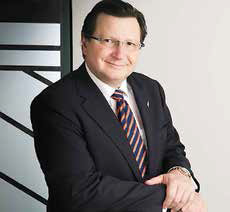
38 Nigel Morrison
Managing Director
SKYCITY Entertainment Group
SKYCITY Entertainment Group operates three monopoly casinos in New Zealand—in Auckland, Hamilton and Queenstown—and two in Australia, in Adelaide and Darwin. Until December 2012, SKYCITY also held a 50% interest in New Zealand’s Christchurch Casino, which it sold to co-owner Skyline Enterprises.
SKYCITY’s normalized revenue was essentially flat year on year at NZ$948 million (US$743 million) for the 12 months ended 30th June, while normalized EBITDA slumped 2.5% to $303.8 million. There were three major factors mitigating the significance of the decline. First, there was a high base of comparison in the year-ago period, when SKYCITY Auckland in particular had benefited from an estimated $6 million windfall from the Rugby World Cup being hosted in New Zealand in December 2011. Furthermore, the sale of Christchurch Casino means income from there is lost from the latest figures. Then there’s the appreciation of the New Zealand dollar against the Australian, diluting earnings at its Australian properties when earnings there were converted to the kiwi. (The company’s latest earnings announcement also made mention of a group of Asian gamblers absconding after racking up $2.4 million of debts at Auckland—a rare enough occurrence to merit attention.)
Despite these one-off factors, it’s fair to say the company’s recent growth has underwhelmed, especially in the context of a booming industry in greater Asia. But SKYCITY hopes to return to growth mode with major expansions at Adelaide and Auckland and by attracting more wellheeled Chinese players.
SKYCITY won legislative approval from the parliament of South Australia in July to expand Adelaide and intends to invest A$300 million (US$270 million) to transform the property into “a truly world-classintegrated entertainment complex,” says Auckland-based CEO Nigel Morrison. The key terms of a revised licensing agreement include a 20-year extension of its monopoly in South Australia to 2035, a lowering of gaming taxes on VIP revenue (i.e. on revenue from Chinese high rollers), permission to introduce cashless gaming and TITO systems, and increases in the permitted numbers of gaming tables and slots.
In May, SKYCITY secured an extension of the license at its flagship Auckland property together with permission to add more slot machines as part of an agreement with the New Zealand government to build a convention center in the country’s most populous city. The agreement is awaiting final approval from Parliament. In return for the NZ$402 million convention center, which is expected to open in 2017 as the centerpiece of government’s economic revitalization plans, SKYCITY Auckland will be allowed an extra 230 machine games and more gaming tables. Its casino license, which was due to expire in 2021, will be extended to 2048.
Mr Morrison has stated his intention to boost the high roller appeal of SKYCITY’s properties with the addition of new VIP gaming rooms and accommodations. He is well acquainted with the preferences of those high rollers from his previous role as group CFO at Macau casino giant Galaxy Entertainment Group.
Mr Morrison joined SKYCITY as managing director in 2008. He has also served as CEO of the Federal Group, Australia’s largest private gaming group, and COO of Crown Limited. Before embarking on his casino career in 1993, he was a corporate finance partner with Ernst & Young in Melbourne, specializing in the gaming industry.
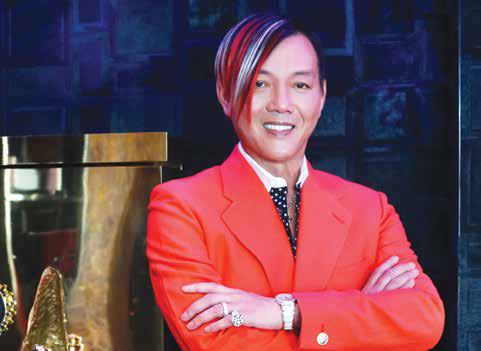 39 Stephen Hung
39 Stephen Hung
Co-Chairman and Executive Director
Louis XIII Holdings Ltd
With his candy-colored bangs, diamonds flashing at his fingers and wrists, a fleet of Italian sports cars in the garage and a fashion model for a wife, financier Stephen Hung could be a walking advertisement for the über-exclusive hotel he plans to open in a few years on Macau’s Cotai Strip.
“The willingness of mainland Chinese to spend money on the very best is unprecedented,” he assured The Financial Times earlier this year.
The implication, of course, is that’s what they’ll find at Louis XIII, which is slated to open in 2016 with 246 luxury suites and villas, the only Michelin 3-star L’Ambroisie outside Paris and an invitation-only “Atelier” with not a couture, bespoke or limitededition goody on the shelves for under $1 million. Peter Marino, who designs flagship stores for luxury brands, has signed on as concept architect charged with bringing the “17th century French Renaissance and Baroque” theme to life. (Don’t mind the historical incongruity. The fat cats won’t.) Mr Hung’s “good friends” Laurence and Francois Graff of the famed diamond merchants are on board, so is Versace, and a fashion designer who claims to be a direct descendant of France’s Bourbon kings has been hired as “special advisor” to Mr Hung and private-equity investor Peter Coker, his co-chairman at Louis XIII Holdings, the project’s Hong Kong-based, Bermudaincorporated owner.
The literature says the resort is “the first of a series of ultra-luxurious lifestyle experiences the Group is planning to offer the world’s wealthiest,” although right now Louis XIII’s sole revenue source is Paul Y. Engineering, a well-known construction management and services company it took over early this year along with PYE’s Hong Kong listing. It was around that time that the project raised half its HK$6.4 billion budget (US$820 million) from a sale of new shares and convertible bonds, $2 billion of which went to buy a company Mr Hung chairs that holds the rights to the Cotai site. The rest is expected to come from borrowings. And the company does boast an impressive list of banking partners. It’s a world Mr. Hung knows well. He’s a former vice chairman of eSun Holdings. At one time, he co-headed investment banking for Asia at Merrill Lynch. At the age of 33 he founded his own firm, Amida Capital Group.
For all his ambition, though, he has yet to secure Louis XIII its all-important gaming license. Reports are that 66 VIP and premium-mass tables are planned, but the company doesn’t talk much about it or the casino operating agreement it has dating back to 2008 with an unnamed “concession or subconcession” believed to be Melco Crown Entertainment. Melco has a longstanding relationship with PYE, which did work for Altira Macau and is involved in the construction of Melco’s Studio City resort on Cotai.
Mr Hung has connections of his own with Sociedade de Jogos de Macau. He’s vice chairman of Rio Entertainment Group, operator of the Rio Hotel & Casino, an SJM satellite on the Macau peninsula.
40 Lim Byoung-soo
President and Chief Executive
Grand Korea Leisure
The top job at South Korea’s Grand Korea Leisure had been vacant for much of this year following the departure of Ryoo Hwa-sun, who was appointed president of a prominent women’s college in January. Lim Byoungsoo, who headed the Gyeonggi Tourism Organisation, was named his successor only last month, taking over at a time when GKL is in critical need of leadership.
Because come 2016, rival Paradise Group is scheduled to open a KRW800 billion (US$730 million) integrated resort at Incheon that will dwarf all of the country’s current small-scale, foreigners-only gaming venues. GKL, on the other hand, has no new venues on the horizon.
Another problem for GKL is its heavy reliance on Japanese players, who make up the majority of its customers, whereas Paradise derives the bulk of its revenue from Chinese, and they’re the country’s fastest-growing inbound visitor group. The number of Japanese visitors to GKL’s three Seven Luck brand casinos in Seoul and Busan fell sharply in the second quarter of 2013, down 19.5% year on year, while the number of Chinese visitors to the country surged 24.2%.
GKL is a semi-private owner and operator that was set up by the government in 2005, through the Korea National Tourism Organisation, to boost tourism and generate income to fund tourism infrastructure and other government projects. In November 2009, GKL floated 30% of its equity on the Seoul Stock Exchange, and there has been talk of more stock being sold to private investors, but the company is still majority-owned by the government.
Paradise had dominated the foreignersonly market for almost four decades before GKL opened and, to its credit, began snapping up share. Now, GKL and Paradise Group together command around 93% of foreigners-only revenues and are locked in a close-run contest for the lead in market share.
But Mr Lim has his work cut out for him formulating a development strategy to keep GKL on an equal footing. He certainly understands that China is where the growth is and the company announced earlier this year that it would be doubling its Chinese VIP marketing staff from 29 to 60. If current trends continue, Chinese will constitute the largest group of players at GKL by 2014. Already, their growing numbers are bolstering the company’s revenue, which rose 4.5% in the second quarter to KRW133.0 billion. EBITDA was up 11.6% to KRW40 billion.
He also faces the difficult task of obtaining government approval to build a new casino. His political contacts should aid him in that regard, as will his track record in promoting tourismboosting initiatives, which is no doubt what GKL will be presenting its planned IR as.
Looking further ahead, there is the expiration of Kangwon Land’s domestic market monopoly in 2025. Authorities say that licensing for at least one new venue catering to Koreans will take place soon after, and GKL and Paradise are the clear front-runners to obtain one of them. Whether GKL succeeds will depend a lot on how Mr Lim manages to position the company over his coming three-year term as president and chief executive.
Next: The Asian Gaming 50 – 2013: 41-50







